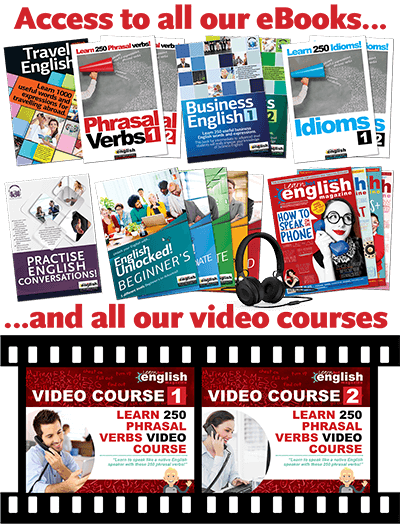Don’t make these 5 mistakes in English!
Making mistakes in English is all part of learning. So, you shouldn’t worry about making them when you’re speaking or writing. But it’s also important to try to eliminate t hem if you can. In this lesson, we’re looking at some typical errors that students make. Don’t make these 5 mistakes in English!
hem if you can. In this lesson, we’re looking at some typical errors that students make. Don’t make these 5 mistakes in English!
How to eliminate errors – 3 tips!
It’s difficult to know when you’ve made a mistake. So, any time your teacher or a friend tells you about an error, you should make a note of it. Then, do these 3 things to help you eliminate it:
- Write out the correct phrase or sentence 10 times.
- Say the correct phrase or sentence 10 times out loud.
- Create a little exercise with the phrase or sentence. For example, you could write out the sentence with a missing word. A few days later see if you can do the exercise. Then, repeat this a few weeks later to check that you’ve remembered the correct way to say it.
Finally, if you ever make the mistake again, repeat this process! ?
Typical mistakes game
OK, are you ready for our little game? First, read over the sentences below with mistakes in them. See if you can identify the typical error. Then, listen to the audio to check your answers. How many did you get right? [scroll down for the answers and explanations]
5 sentences with mistakes – can you spot the errors?
1 I’ve been thinking at taking up skiing as a hobby.
2 The area was uninhabited except a few animals.
3 Suddenly, it was a loud noise down the hall.
4 There has been many problems with the new employee.
5 I was sick all the day yesterday.
6 We went to a steakhouse for dinner on last night.
CLICK BELOW TO LISTEN TO THE AUDIO
Answers & explanations
1 I’ve been thinking about taking up skiing as a hobby. /
I’ve been thinking of taking up skiing as a hobby.
Remember, we use the preposition about or of with the verb to think.
2 The area was uninhabited except for a few animals.
We often use the preposition for with except.
3 Suddenly, there was a loud noise down the hall.
This is a confusion between There and It. The first time we mention the presence or existence of something, we often use There. Then, if we refer to this thing again, we use It. For example:
There was a cat in the room. It was a big black cat.
4 There have been many problems with the new employee.
As the word problems is plural, we need the plural form have.
5 I was sick all day yesterday. / I was sick the whole day yesterday.
All day and all night are little phrases that we often use without the.
6 We went to a steakhouse for dinner last night.
Last night is another set phrase that we often use without a preposition.



